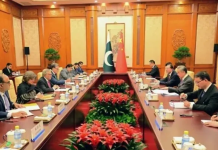PIDE’s call to action targets a broad audience, including policymakers, educational institutions, and the private sector, urging them to deliberate on the study’s findings and recommendations
DNA
ISLAMABAD, MAR 17: In a pioneering move, the Pakistan Institute of Development Economics (PIDE), a Premier National Think Tank, has made public its investigative report titled “GORs Everywhere: University Land for Public Housing.” Authored by Nadeem Ul Haque, Vice Chancellor, Pakistan Institute of Development Economics (PIDE), M. Jehangir Khan, and Iram Nadeem, this study embarks on a critical analysis of the conventional utilization of university lands, predominantly allocated for housing within educational institutions’ premises. It advances a transformative outlook proposing the allocation of these tracts for commercial endeavours through Public-Private Partnerships (PPP), aiming at amplifying universities’ revenue streams whilst augmenting local economies and societal well-being.
According to the Press Release issued from the PIDE, Islamabad office, the report states that Universities globally have evolved from their traditional roles to become contemporary, business-oriented centres of education and research, enjoying greater autonomy and financial independence. This shift comes as higher education faces the dual challenges of growth and sustainability, prompted by the scarcity of tax dollars and diminishing societal support. In response, institutions are increasingly adopting entrepreneurial approaches, including self-promotion, forging partnerships, and embracing technological innovations, to thrive in the knowledge economy and align themselves as competitive entities in both domestic and international arenas.
In Pakistan, universities confront similar financial challenges and debates over resource allocation, particularly concerning the construction of housing colonies on campus lands. Such practices are criticized for squandering valuable assets that could be more strategically utilized to enhance the institutions’ financial viability and fulfil their educational missions more effectively.
Central to the study’s findings is an insightful comparison between the land use strategies employed by globally renowned universities such as Harvard, Princeton, and Yale, and their counterparts in Pakistan. This contrast not only sheds light on the successful financial models adopted by these international institutions—stemming from strategic investments in commercial ventures on their campuses—but also underscores the significant potential for Pakistani universities to replicate such success. Through meticulous analysis, the report brings to the fore the extensive opportunity costs entailed by the maintenance of residential colonies on university lands, underpinned by the examination of high property values across major cities including Islamabad, Lahore, and Peshawar.
Emerging from these observations, PIDE posits a series of policy reforms aimed at reimagining the use of university lands. Key among these is the suggestion to monetize residential perks for faculty and staff by introducing market-rate rentals for university-owned properties, thereby creating a new income stream. Furthermore, the institute advocates for the development of high-rise residential and commercial complexes, a move anticipated to optimize land use and maximize revenue generation. Central to realizing these visions is the establishment of PPP ventures, characterized by clearly defined profit-sharing models and ownership structures, ensuring that universities retain land ownership over the long term.
PIDE’s call to action targets a broad audience, including policymakers, educational institutions, and the private sector, urging them to deliberate on the study’s findings and recommendations. By embracing these innovative land-use strategies, Pakistani universities stand on the brink of achieving financial independence, reducing their reliance on government funding, and significantly contributing to the country’s economic growth and social development.

















